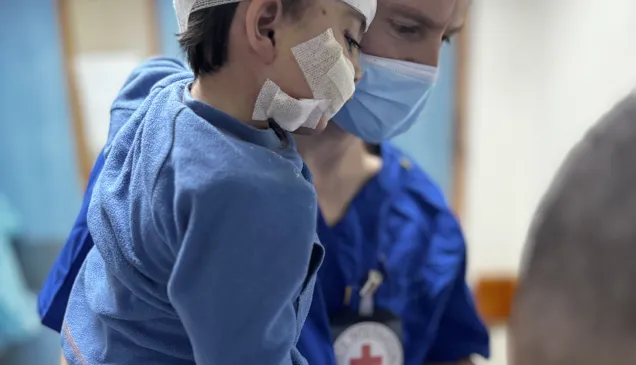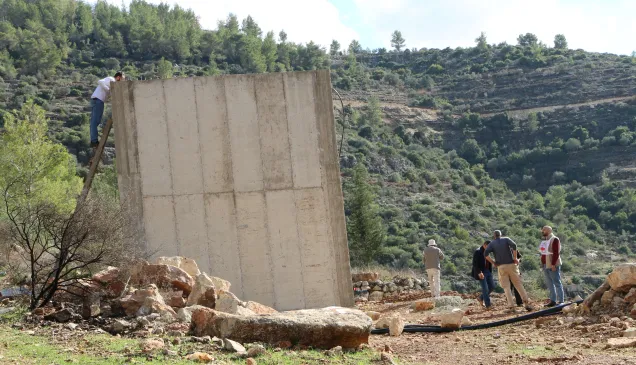The Red Cross Field Hospital one year on: A lifeline and a stark reminder in Gaza
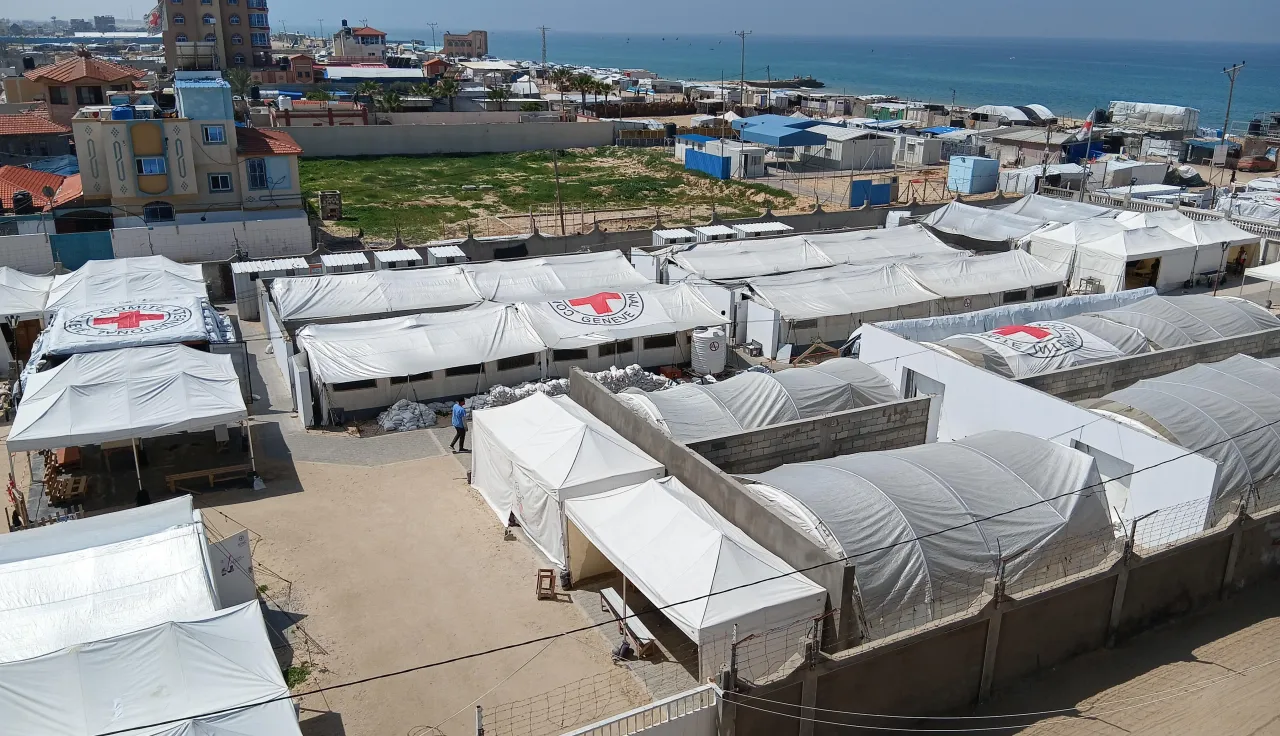
In the dry Gaza wind, the dust never quite settles. It clings to the canvas walls of the Red Cross Field Hospital, swirling through its walkways, and coating the skins of its patients and the doctors and nurses as they make their rounds. They move swiftly from one tent to another, patient charts in hand, heads down, concentrating on what the next patient might need while constantly trying to anticipate what may happen next in this most challenging and unpredictable of working environments.
In the distance – or sometimes, alarmingly nearby – explosions can be heard. Staff never get used to it, but here they can’t afford to be distracted. Each day, hundreds of patients and their caretakers rely on these medical professionals as their last line of defense.
The staff here have responded to wave after wave of mass casualties, treated thousands of outpatients, conducted surgeries on torn limbs, and dealt with open fractures and severe burns. During the ceasefire, they delivered babies and focused on post-operative rehabilitation, before the resumption of hostilities once again filled hospital beds with casualties. Each day is different, but their commitment remains the same.
A temporary measure, one year later
It has been one year since the International Committee of the Red Cross (ICRC) opened its field hospital in Rafah, Gaza – with the strong leadership of the Norwegian Red Cross and alongside the Palestine Red Crescent Society (PRCS) and thirteen other National Societies. One year since this temporary measure – intended to bridge a gap in a time of emergency – became an opportunity for people to seek desperately-needed medical support.
Today, the field hospital remains a lifeline for thousands of people. It stands as a testament to the courage of health workers and the will to survive of the patients whose lives have been shattered by this war. Yet it is also a stark reminder of all that has been lost – and of everything that should be protected under international humanitarian law.
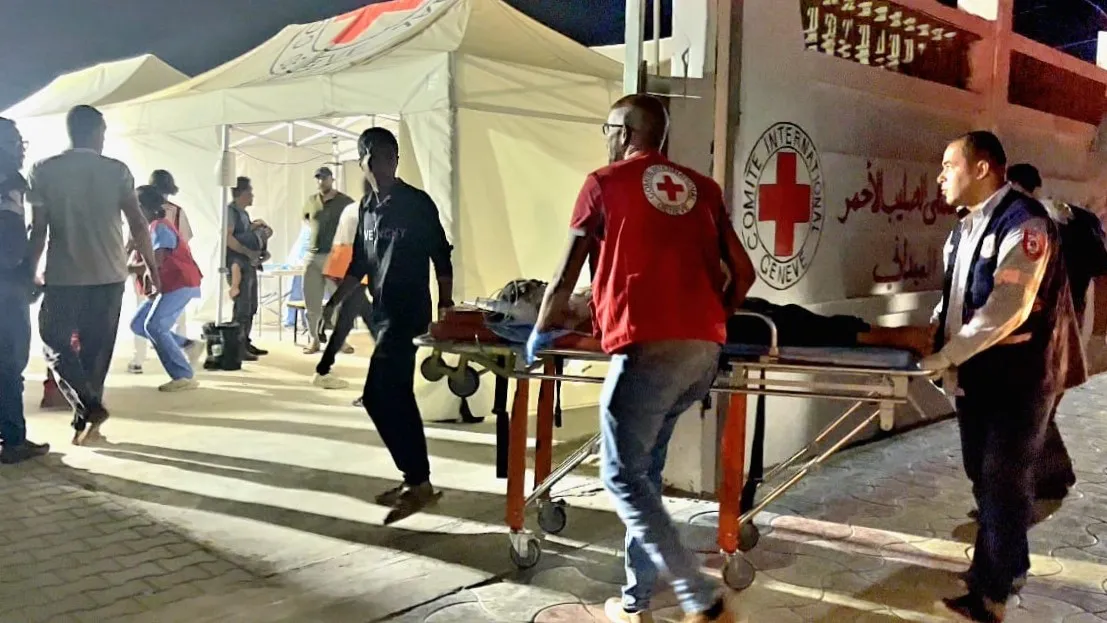
An emergency response to an ongoing crisis
When the Red Cross Field Hospital first opened, it was in response to an urgent and desperate need. Hostilities had severely damaged or destroyed much of Gaza’s health infrastructure. Patients and medical staff were under constant threat. Supplies were critically low. The field hospital, designed to be deployed quickly in conflict zones, was never meant to replace a functioning health system. It was meant to save lives until hospitals could rebuild, until civilians could safely access care.
One year later, the field hospital remains.
Every day, teams of doctors, nurses, and volunteers work to the very edge of their limits to provide emergency surgery, maternal care, pediatric services, and outpatient treatment.
Relentless work to save lives
Throughout this year, the beating heart of the Red Cross Field Hospital has been the people inside it – the patients and the staff. Their experiences, their reflections, and their stories help us understand not just what has been endured, but what continues to be at stake.
Diary entry, Dr Jouni Hirvioja, a 41-year-old emergency doctor from Turku, May 2024
“Yesterday we performed a C-section for a healthy baby boy. Sometimes the events are purely joyful. However, I see more purely unnecessary misery. Shrapnel, explosion, gunshot, and burn injuries. So many are left without the previously ordinary treatment: where can I direct a diabetic to when you can no longer get insulin pens or glucose meters in Gaza?
All our local workers have experienced great losses. For some, almost their entire family has been killed, and the majority live in makeshift tents. Their determination to help others despite what they themselves are going through is incredible. Even if the commute -- sometimes for three to four hours by donkey cart -- as long as they can find a way to get here, they come to every shift.
I am on call this evening and night, so I keep my radio on. On call or not, if someone is seriously injured at night or there is a surgery, I am at work. We are on-call 24-7.”
Patients have been able to access care at the hospital thanks to the relentless work of ambulance medics and first responders from the Palestine Red Crescent Society (PRCS). Since the Field Hospital opened, these teams have risked their lives daily, travelling into dangerous areas to reach the wounded and transport them to safety. Their bravery and commitment have been vital – not only in getting patients to the Field Hospital, but also in ensuring that those needing specialized care could be transferred onward. Without them, far fewer lives would have been saved.
A fragile pause before a swift return to crisis mode
During the temporary ceasefire earlier this year, the atmosphere inside the field hospital shifted, if only slightly. For a few precious weeks, the constant rhythm and pace of incoming trauma cases slowed. Staff had time to catch their breath, restock supplies, and focus on longer-term care and rehabilitation.
Patients, too, found moments of calm — some were able to receive more thorough follow-up care, and children began to play again outside the tents.
But when hostilities resumed, the silence was broken. The hospital was quickly responding once more to casualties, and the team returned to emergency mode — treating complex injuries, performing surgeries around the clock, and doing their best to save lives with limited resources and uncertainty about the future. The contrast was stark, and a painful reminder of how fragile peace remains.
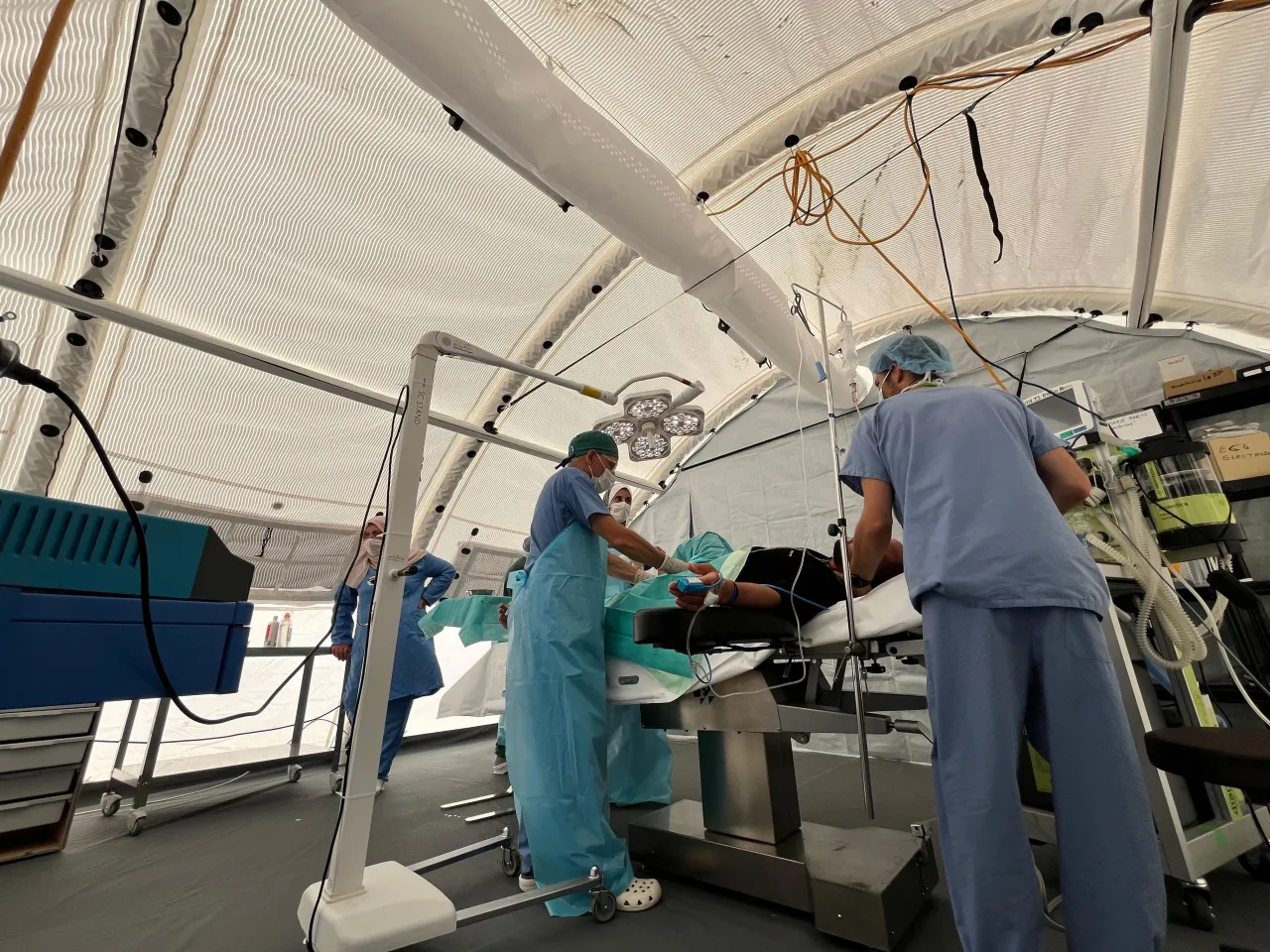
The protection of health care: A legal obligation
International humanitarian law is clear: medical personnel and facilities must be respected and protected in all circumstances. All parties must ensure that hospitals and medical facilities remain sanctuaries to preserve human life.
The Field Hospital’s continuing operation one year on is a sober reminder of the reality of life in Gaza.
The human toll behind the numbers
Since its opening, the Red Cross Field Hospital has treated over 80,240 patients. Behind each statistic is the story of a human life: a child recovering from shrapnel wounds and unthinkable burns, a mother surviving childbirth against the odds, a father learning to walk again after surgery.
These stories remind us why we are here — and why we hope, fervently, to one day be able to leave.
The ICRC remains committed to supporting the people of Gaza. Our teams continue to work with our Red Cross and Red Crescent partners and local health workers, offering not just medical care but training, mentorship, and support. But ultimately, the goal is to ensure that people can once again seek care in a permanent hospital with facilities designed for healing, not for emergency survival.
We mark this one-year anniversary with mixed emotions. Gratitude for what has been possible. Grief for what has been lost. And a hope that, one day soon, the Red Cross Field Hospital will be able to close its doors.
The Red Cross Field Hospital was implemented in coordination with the Palestine Red Crescent Society and Norwegian Red Cross, and supported by Red Cross Societies of Australia, Austria, Canada, Denmark, Finland, France, Germany, China (Hong Kong), Iceland, Japan, Sweden, Switzerland and the United Kingdom.

